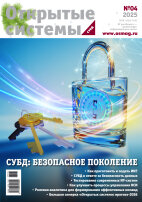.jpg) COVER FEATURES
COVER FEATURES
HPC INFRASTRUCTURE
Exascale Store for Scientific Data
Metadata have become an integral part of a global architecture of scientific information storage and preservation. Efficient metadata access and handling is a fundamental problem for data-intensive science. In this paper, we will describe experience and evaluation of how non-relational database technology can be used to store LHC experiments metadata.
Maria Grigorieva (grigorieva_ma@nrcki.ru), Marina Golosova (golosova.marina@gmail.com), Yevgeny Ryabinkin (rea@grid.kiae.ru), Kurchatov Institute; Alexey Klimentov (alexei.klimentov@cern.ch), Brookhaven National Laboratory, Kurchatov Institute.
Porting Parallel Programs Without Loss of Efficiency
Hardware architectures change more rapidly than software. Sooner or later, the need to port programs arise, and while the task is easy for sequential code, it is harder for parallel software, which should still work efficiently on a new architecture. Program parametrization allows to manage the mapping of code onto a specific computing system’s memory hierarchy while preserving the benefits offered by parallelism.
Jumana Abu-Khalil, Sergey Guda, Boris Steinberg (borsteinb@mail.ru), Southern Federal University.
Machine Learning for LHC Data Storage Systems
In recent years, hybrid data storage systems become more popular. Machine learning algorithms are widely used to increase the performance of such systems. Algorithms of classification, regression and time series analysis can predict data popularity in the future. The predicted data popularity is used to determine optimal number of replicas of the files in the system and the data storage type to store them.
Mikhail Gushchin (mikhail91@yandex.ru), Yandex School of Data Analysis, Moscow Institute of Physics and Technology; Andrey Ustyuzhanin (naderi@yandex.ru), Yandex School of Data Analysis, Moscow Institute of Physics and Technology, National Research University Higher School of Economics, NRC ”Kurchatov Institute”, Philippe Charpentier (Philippe.Charpentier@cern.ch), CERN.
OSJ FORECAST
Transforming Everything: OSJ’s «Big Seven» Forecasts for 2016
Will 2016 become the beginning of a Digital Business era?
Natalya Dubova (osmag@osp.ru), science editor, Open Systems Journal.DBMS.
PLATFORMS
A Secure OS for High-Performance Computing
HPC systems sometimes are used for special-purpose applications requiring a runtime environment that offers strong security features.
Dmitry Kulnev, Roman Modyanov, Alexey Petrik (RMShagaliev@vniief.ru), research fellows, Russian Federal Nuclear Center, All-Russian Research Institute of Experimental Physics.
SOFTWARE ENGINEERING
Looking into the Future
No matter what business you’re in, you’re also in the software business. But where are we heading?
Christof Ebert (christof.ebert@vector.com), managing director, Vector Consulting Services.
IT MANAGEMENT
IT Infrastructure Monitoring Tools
What’s the cost of our IT services? How do they map to different applications? What are the availability and performance of our services in geographically dispersed centers? How can we effectively reduce the total cost of ownership while improving service quality? A good starting point is to actively use IT- monitoring technology. It provides a quantitative starting point that—with a good understanding of IT systems and service needs—facilitates improving your IT performance.
Nicolas Serrano, Gorka Gallardo, Josune Hernantes ({nserrano,jhernantes,ggallardo}@tecnun.es), professors, University of Navarra.
DBMS
Search, Monitoring, and Analysis in Social Networks
Modern social networks are daily growing, petabytes-sized mountains of unstructured data that are difficult to collect, process and store using traditional approaches. In theory, technologies from the Hadoop stack can be used to address the tasks efficiently, yet in practice Hadoop-based projects can turn out to be rather costly.
Yevgeny Rabchevsky, assistance lecturer, Perm State University; Alexander Bezrukov, Nikolay Pyannikov (info@seuslab.ru), SEUSLab.
STANDARDS
A Unified Tool for Web Development
The explosive growth of Internet would not be possible without a unified approach to handling Web data. One of the emerging protocols for orchestrating the operations of websites and applications is OData, which allows to create new and reuse existing RESTful applications.
Vladislav Golovkov, Andrey Portnov, Victor Chernov ({vg, ap, vc}@databoom.space), managing partners, Databoom.
Where Is Everywhere: Bringing Location to the Web
Hitherto rich geographical information has been a valuable, but highly specialized, corner of the Web. a linked Web that understands geographical concepts will immediately make much of the Web more useful to the developers of Web applications and will provide an important context for the emerging Internet of Things.
Kerry Taylor (kerry.taylor@acm.org), principal research scientist, CSIRO; Ed Parsons (eparsons@google.com), Geospatial Technologist, Google Research.
EXPERIENCE
ALM for the service provider
How to increase the transparency of enterprise IT-infrastructure and reduce the cost of its mainnance? Application lifecycle management allows to organize the processes of creating and modifying business systems.
Dmitry Volkov (vlk@keldysh.ru), fellow, Keldysh Institute of Applied Mathematics, editor-in-chief, Open Systems Journal.DBMS.
OPINION
Oil & Gas Exploration Lacking Big Data
Big Data is still relatively little used in Russian oil and gas industry. CIOs at large local oil companies are all but silent on their planned initiatives in the area. There are still too many barriers hindering real-world use of Big Data technologies in the country’s oil and gas sector.
Fyodor Krasnov (Krasnov.FV@Gazprom-neft.ru), lead expert, Gazpromneft NTC.
OS ACADEMY. Universities
University Training in Big Data Technology
When developing university training courses on Big Data technology, there can be methodology issues, but aside from that difficulties may arise related to getting access to data sets and relevant tools. When this is the case, the most efficient approach turned out to be the deployment of a Hadoop/Spark virtualized environment.
Vladimir Krylov (vkrylov@heterarchica.com), professor, Nizhny Novgorod State Technical University, National Research University Higher School of Economics.
OS ACADEMY. Library
Technology Inside and Around us
The featured topics of July, August, September, and September issues of the Computer Magazine (IEEE Computer Society, Vol. 48, No. 7-10, 2015) are systems adapting their behavior depending on the results of their state self-analysis, ways of addressing issues created by irregular algorithms, things to do for faster unlocking the Internet of Things’ potential, and the fusion of humans and computers.
Alexander Tyrenko (shoorah@osp.ru), reviewer, Computerworld Russia.



